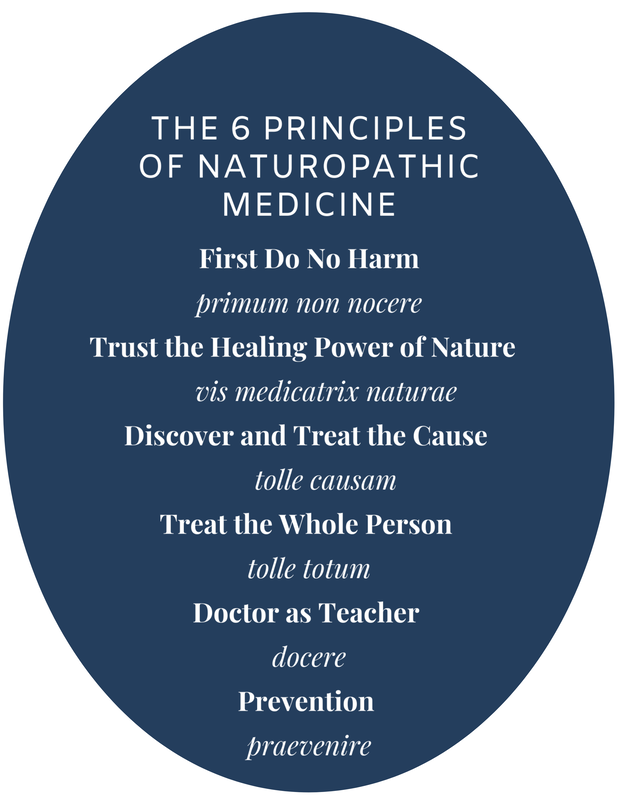What is Naturopathic Medicine?
Naturopathic medicine, also called "naturopathy," is a system of primary health care that emphasizes prevention and the self-healing process through the use of natural therapies. Naturopathic doctors (NDs) blend centuries-old knowledge and a philosophy that nature is the most effective healer with current scientific research on health and human systems.
Diagnosis focuses on identifying the underlying causes of disease by evaluating systems that are out of balance. Treatment is aimed at restoring balance by removing or correcting the cause, be it physical, environmental, spiritual, hormonal, biochemical, etc.
|
Naturopathic therapies are supported by research drawn from peer-reviewed journals from many disciplines and cultures, including naturopathic medicine, conventional medicine, clinical nutrition, phytotherapy, pharmacognosy, homeopathy, psychology and spirituality. Naturopathic doctors have in common with one another a solid foundation of six fundamental guiding principles (see below or read a detailed description). Core treatment modalities of naturopathic medicine include botanical medicine, hydrotherapy, homeopathy, clinical nutrition, and physical manipulation (see Services for more information).
|
What training do naturopathic doctors receive?
|
Licensed naturopathic doctors in the province of British Columbia must meet the following requirements:
|
NDs are primary care physicians clinically trained in all aspects of family health — from pediatric to geriatric care. NDs cooperate and collaborate with other medical professionals, referring patients to (and receiving patients from) conventional medical doctors and other specialists when appropriate.
How are naturopathic doctors different from
medical doctors?
Educated in all of the same basic sciences as a medical doctor (MD), a naturopathic doctor (ND) uses the Western medical sciences as a foundation for diagnosis and treatment. Just like MDs, NDs must pass rigorous professional board exams before they can be licensed by a province or jurisdiction. For at least the final two years of the medical program, naturopathic medical students intern in clinical settings under the close supervision of licensed professionals.
NDs, however, also study holistic approaches to therapy with a strong emphasis on disease prevention and promoting wellness. In addition to a standard medical curriculum, NDs are trained in clinical nutrition, homeopathic medicine, botanical medicine, psychology, physical medicine and counseling. Another important feature is the treatment philosophy: NDs see the physician as someone who facilitates healing by identifying and removing barriers to health.
NDs, however, also study holistic approaches to therapy with a strong emphasis on disease prevention and promoting wellness. In addition to a standard medical curriculum, NDs are trained in clinical nutrition, homeopathic medicine, botanical medicine, psychology, physical medicine and counseling. Another important feature is the treatment philosophy: NDs see the physician as someone who facilitates healing by identifying and removing barriers to health.
Along with other physicians, the naturopathic doctor strives not only to improve the health and welfare of the individual, but also the health and welfare of the community and planet. Naturopathic medicine is a legislated profession, and as such, is committed to on-going research and development of its practice. Click here to read more about how the education of a naturopathic doctor (ND) compares with that of a medical doctor (MD).
**It can be difficult to find a doctor in BC. If you're looking for a primary care doctor in BC who is accepting new patients, I can help. Appointments are available in-person in Kelowna or virtually from anywhere in BC.





